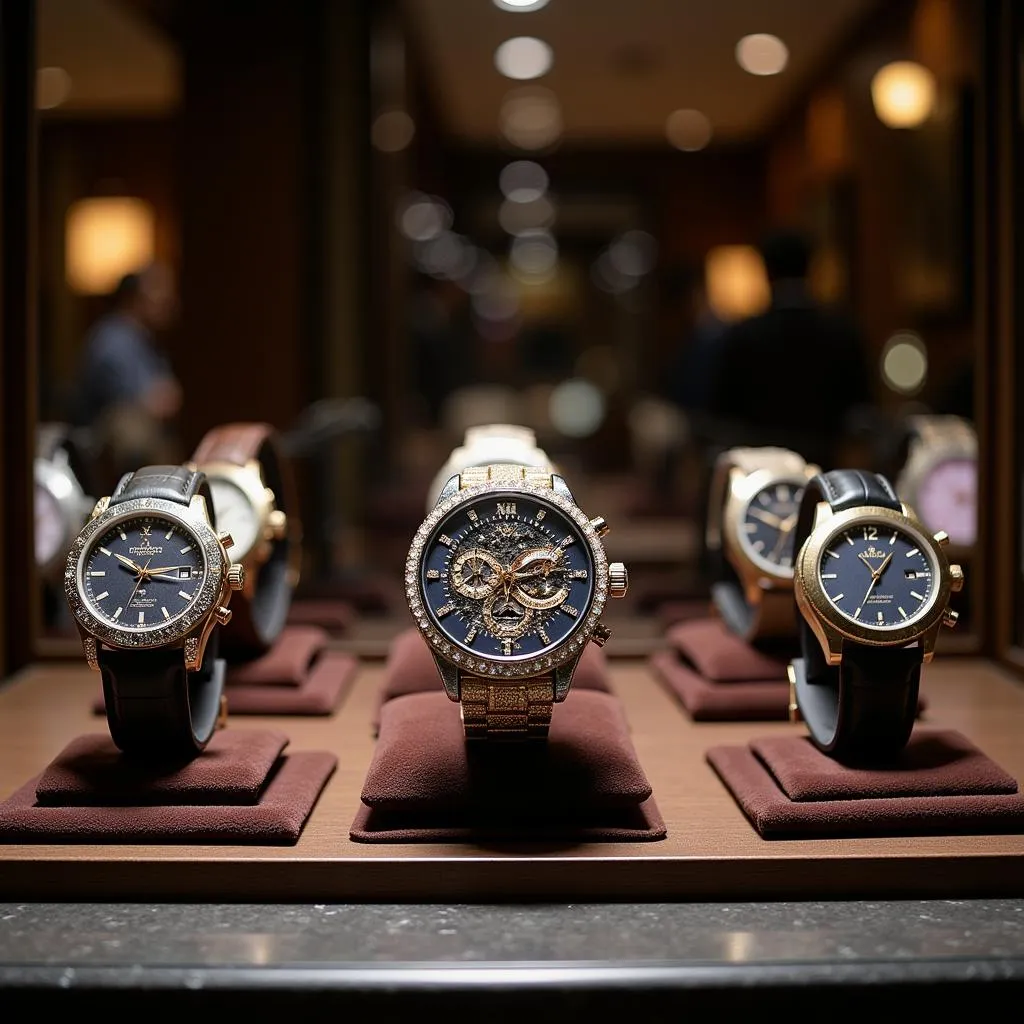The IELTS Speaking test often includes questions about personal preferences and aspirations. One such topic that frequently appears is describing an expensive item you would like to own. This subject allows examiners to assess your ability to express desires, explain reasons, and discuss hypothetical situations. Let’s explore how to tackle this topic effectively and maximize your Speaking score.
Describe a concert you want to attend is another popular topic that tests similar language skills. Both topics require you to articulate personal preferences and provide detailed descriptions.
Part 1: Introduction and Interview
In Part 1, the examiner may ask general questions about expensive items. Here are some common questions and suggested answers:
-
Do you like shopping for expensive items?
Band 6-7 Answer: “Yes, I enjoy looking at expensive items occasionally. It’s interesting to see the latest designs and high-quality products, even if I can’t always afford them.”
Band 8-9 Answer: “While I’m not particularly inclined towards extravagant spending, I do find it fascinating to explore high-end products from time to time. It’s a great way to appreciate craftsmanship and innovative design, even if purchasing isn’t always feasible.”
-
What’s the most expensive thing you’ve ever bought?
Band 6-7 Answer: “The most expensive thing I’ve bought is probably my smartphone. It cost quite a lot, but I use it every day, so I think it was worth the investment.”
Band 8-9 Answer: “I’d say my laptop has been my most significant investment to date. Although it came with a hefty price tag, its robust performance and reliability have proven invaluable for both my work and personal projects, making it a worthwhile expenditure in the long run.”
Part 2: Long Turn
Here’s a sample cue card for this topic:
Describe an expensive item you would like to own
You should say:
- What the item is
- Why you want to own it
- How you would use it
- And explain why it is so expensive
 Luxury watch display in a high-end boutique
Luxury watch display in a high-end boutique
Band 6-7 Sample Answer:
“The expensive item I’d really like to own is a luxury watch, specifically a Rolex Submariner. I’ve always been fascinated by watches, and Rolex is known for its quality and prestige.
I want to own this watch because it’s not just a timepiece, but also a symbol of success. It would remind me of my goals and motivate me to work harder. Plus, I think it would look great with both casual and formal outfits.
If I had this watch, I would wear it daily. It’s designed to be durable, so it would be perfect for everyday use. I’d also take good care of it and maybe even pass it down to my children one day as a family heirloom.
The Rolex Submariner is so expensive because of its high-quality materials and craftsmanship. It’s made with precious metals like gold or platinum, and the movement inside is very complex. Rolex also has a strong brand reputation, which adds to the price. Despite the cost, many people see it as an investment because these watches often retain their value over time.”
Band 8-9 Sample Answer:
“If I were to indulge in a truly luxurious purchase, I’d be drawn to acquiring a bespoke, handcrafted Patek Philippe Grandmaster Chime wristwatch. This extraordinary timepiece represents the pinnacle of horological artistry and engineering prowess.
My desire to own such an exquisite item stems from a deep appreciation for the unparalleled craftsmanship and technological innovation it embodies. It’s not merely a watch, but a masterpiece of mechanical ingenuity that showcases human skill at its finest. Owning it would serve as a constant reminder of the heights of human achievement and inspire me to strive for excellence in my own endeavors.
While I would certainly wear this timepiece on special occasions, its primary function would be as a cherished collector’s item. I’d take great pleasure in studying its intricate mechanisms, perhaps even learning more about the art of watchmaking in the process. It would undoubtedly become a focal point for intellectual discussions with like-minded enthusiasts.
The astronomical price of the Grandmaster Chime is justified by several factors. Firstly, it’s an incredibly complex mechanism, featuring 20 complications and over 1,366 individual components, each meticulously crafted and assembled by hand. The level of skill required for such precision is exceedingly rare. Secondly, it’s produced in extremely limited quantities, enhancing its exclusivity. Lastly, the materials used are of the highest quality, including precious metals and flawless gemstones. The combination of rarity, complexity, and prestige of the Patek Philippe brand culminates in a timepiece that is as much a work of art as it is a functional object, hence its position as one of the most expensive watches in the world.”
Follow-up questions:
- How do you think owning such an expensive item might change your life?
Band 6-7 Answer: “I think owning such an expensive watch would make me feel more confident and successful. It might also help me make a good impression in professional settings.”
Band 8-9 Answer: “While the acquisition of such a prestigious item might provide a momentary boost to one’s self-esteem, I believe its true value lies in the perspective it offers. It could serve as a tangible reminder of the rewards of hard work and dedication, potentially catalyzing personal growth and ambition. However, it’s crucial to maintain a balanced view and not let material possessions define one’s worth or happiness.”
- Do you think it’s worth spending so much money on a single item?
Band 6-7 Answer: “It depends on the person’s financial situation and priorities. For some people, it might be worth it if they really appreciate the item and can afford it without financial stress.”
Band 8-9 Answer: “The value of such an investment is highly subjective and contingent on various factors. From a purely financial standpoint, certain luxury items can be seen as alternative investments, potentially appreciating over time. However, the intangible benefits, such as personal satisfaction or the pursuit of a passionate interest, may outweigh monetary considerations for some individuals. Ultimately, the decision should be made after careful consideration of one’s financial health, long-term goals, and personal values to ensure it aligns with overall life objectives.”
Part 3: Two-way Discussion
Examiner: “Let’s talk more about expensive items. Do you think people are becoming more materialistic nowadays?”
Band 6-7 Answer: “Yes, I think people are becoming more materialistic. With social media, there’s a lot of pressure to show off expensive things. Many people want the latest gadgets or designer clothes to feel good about themselves or impress others.”
Band 8-9 Answer: “The perception of increased materialism is indeed prevalent, and there are several factors contributing to this phenomenon. The ubiquity of social media has created an environment where the display of material wealth is often equated with success and happiness. This constant exposure to curated lifestyles can fuel a desire for conspicuous consumption.
However, it’s important to note that this trend isn’t universal. There’s also a growing counter-movement emphasizing minimalism and experiences over possessions, particularly among younger generations. This dichotomy reflects the complex relationship modern society has with material goods.
Moreover, the definition of materialism itself is evolving. For some, investing in high-quality, long-lasting items could be seen as materialistic, but it might also reflect a more sustainable approach to consumption. Therefore, while surface-level materialism may be more visible, the underlying attitudes towards possessions and their perceived value are becoming increasingly nuanced and multifaceted.”
 Minimalism vs Materialism concept illustration
Minimalism vs Materialism concept illustration
Examiner: “How do expensive purchases affect the economy?”
Band 6-7 Answer: “Expensive purchases can be good for the economy because they create jobs in luxury industries and generate tax revenue. However, if too many people spend all their money on expensive items, it might not be good for overall economic stability.”
Band 8-9 Answer: “The impact of high-value purchases on the economy is multifaceted and can be analyzed from various perspectives. On a macro level, luxury spending can stimulate economic growth by supporting industries that require highly skilled labor, thus creating well-paying jobs and fostering innovation. These sectors often have a significant multiplier effect, benefiting suppliers, retailers, and ancillary services.
Moreover, luxury goods frequently attract international consumers, contributing to a country’s export earnings and bolstering its balance of trade. The tax revenue generated from these high-ticket items can also be substantial, potentially funding public services and infrastructure.
However, an economy overly reliant on luxury consumption may face challenges. It can exacerbate income inequality, potentially leading to social tensions. There’s also the risk of economic volatility, as luxury spending tends to be more sensitive to economic downturns.
From a sustainability standpoint, the production of certain luxury goods may have environmental implications, although many high-end brands are now at the forefront of adopting sustainable practices.
In essence, while luxury purchases can inject vitality into specific economic sectors, a balanced approach that also encourages broader-based consumption and investment is crucial for long-term economic health and stability.”
Key Vocabulary and Phrases for High Scores
-
Exquisite /ɪkˈskwɪzɪt/ (adjective): Extremely beautiful and delicate.
Example: “The watch features an exquisite hand-painted dial.” -
Craftsmanship /ˈkrɑːftsmənʃɪp/ (noun): The quality of design and work shown in something made by hand; artistry.
Example: “The level of craftsmanship in luxury watches is outstanding.” -
Prestigious /preˈstɪdʒəs/ (adjective): Inspiring respect and admiration; having high status.
Example: “Owning a prestigious timepiece can be a symbol of success.” -
Intricate /ˈɪntrɪkət/ (adjective): Very complicated or detailed.
Example: “The intricate mechanism of the watch requires skilled assembly.” -
Indulgence /ɪnˈdʌldʒəns/ (noun): The action or fact of indulging; the state or attitude of being indulgent.
Example: “Purchasing such an expensive watch would be a significant indulgence.”
Describe a memorable gift you received is another topic where you can use some of these vocabulary items to describe special objects and their significance.
Examiner’s Advice
To score high in the IELTS Speaking test when discussing expensive items:
- Use a range of vocabulary related to luxury, quality, and value.
- Explain your thoughts clearly and provide detailed reasons for your opinions.
- Discuss both personal and societal aspects of expensive purchases.
- Use complex sentence structures and idiomatic expressions where appropriate.
- Practice describing items in detail, focusing on appearance, function, and emotional value.
Remember, it’s not just about the expensive item itself, but how well you can articulate your thoughts and engage in a meaningful discussion about it. Good luck with your IELTS preparation!
Describe an outdoor activity you tried for the first time is another topic where you can practice describing experiences in detail, which is a valuable skill for the IELTS Speaking test.


